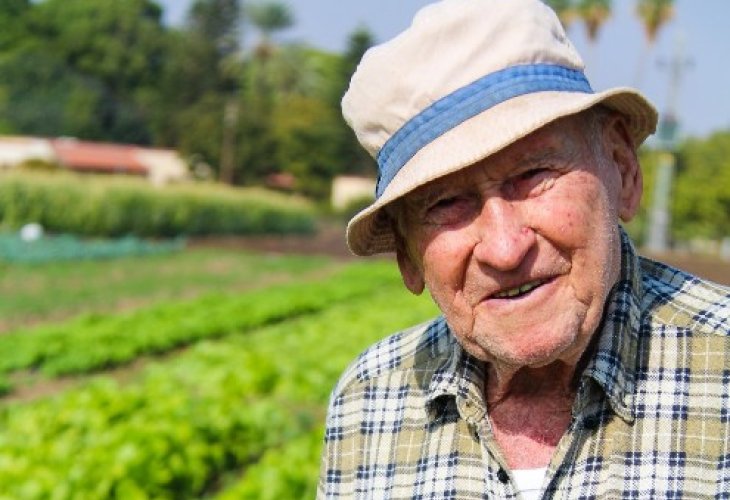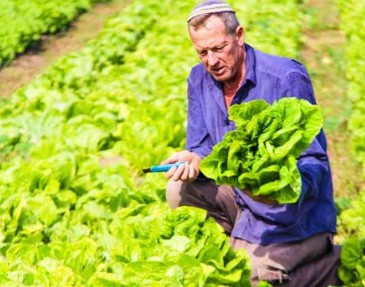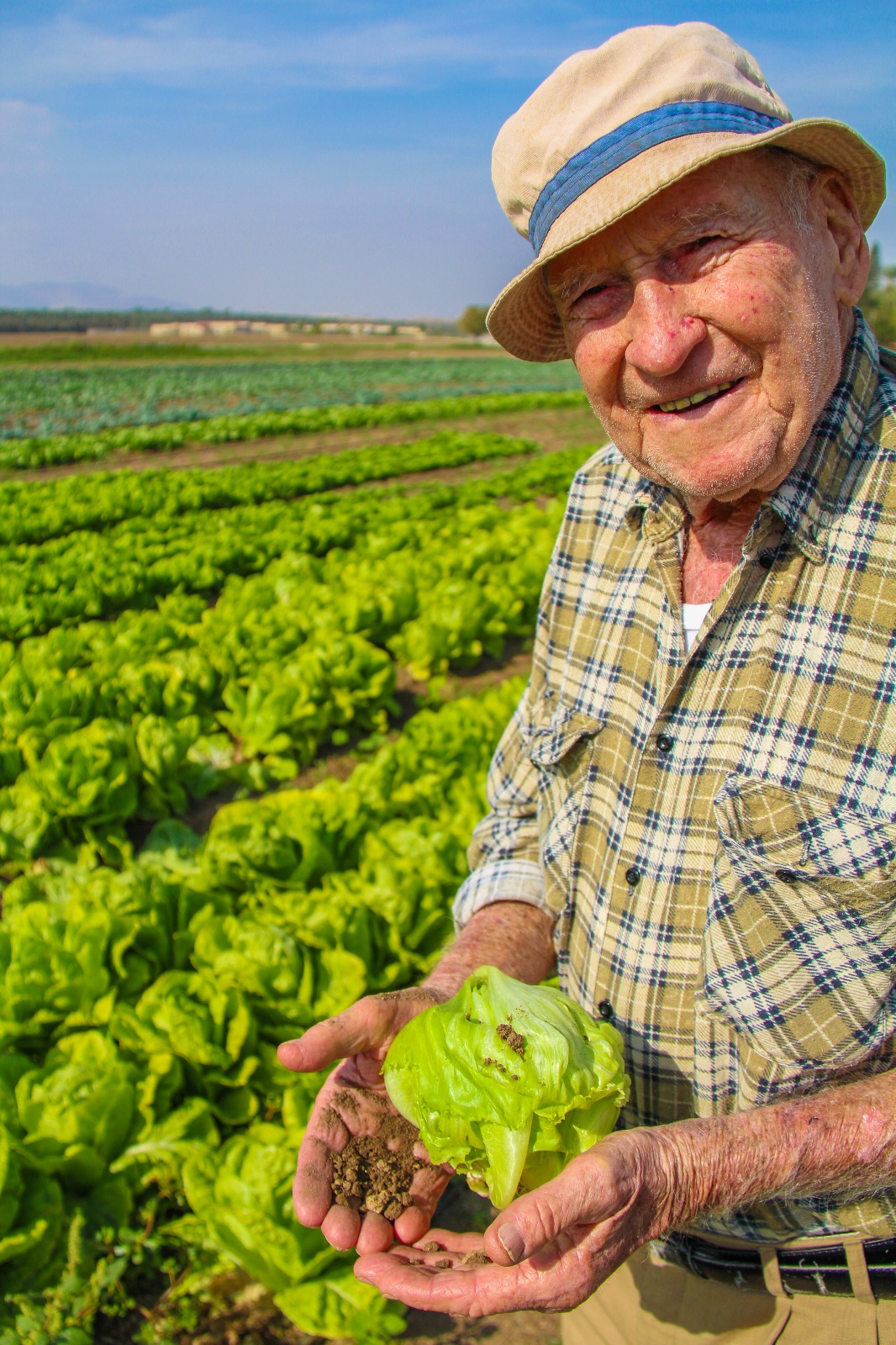Health and Nutrition
The Pioneer of Organic Farming in Israel: The Legacy of Mario Levy
How a visionary kibbutz farmer transformed Israeli agriculture through faith, innovation, and a return to nature’s balance
 The father, Mario Levy (Credit: Or Levy)
The father, Mario Levy (Credit: Or Levy)“My father used to say that when God placed man in the Garden of Eden ‘to work it and to guard it,’ it means: you, the human being – don’t interfere,” says Boaz Levy with longing. He is the son of the late Mario Levy, one of the pioneers of organic agriculture in Israel. In 1982, Mario founded the Organization for Biological-Organic Agriculture in Israel and headed it for many years. He passed away at the age of 94. Boaz continues his path: “He brought me into it three years before he passed away. From then on, I started working with him on 25 dunams of organic land where we grew vegetables.”
Mario Levy was born in Trieste, Italy, and immigrated to the Land of Israel in 1939 at age 15 as part of Youth Aliyah. In 1941, he joined the religious kibbutz Sde Eliyahu as part of a group of graduates of the Mikveh Israel agricultural school. He and his wife raised five children on the kibbutz. In the 1960s, he was in charge of the kibbutz vegetable fields. The increasing use of pesticides of up to 40 sprayings per crop, and the appearance of resistant pests began to deeply disturb him.
Boaz recounts: “My father, of blessed memory, was known in agriculture even before the ‘organic bug’ bit him. He ran a very successful farm with good income, but then the problems started. For example, we had a pepper crop that was hit by a virus. They didn’t know what it was and tried all sorts of methods to solve it. I remember as a kid that the peppers used to be gorgeous — big and beautiful, and over the years they became skinny, small, ugly, with many diseases. They sprayed and sprayed and got to 35 sprays a year, which is not normal. It’s a lot.
“Later they grew carrots, and as soon as they sowed, a caterpillar called Spodoptera came, ‘shaved’ everything, and left a bald field. There were all kinds of problems that were hard to explain. My father, who was very organized and kept detailed records, sat down to investigate. He had a daily log for produce and developments. He tracked every crop. He understood that something was wrong at the root if he needed 35 sprays on peppers. He realized he had to start something new, and that’s how he reached organic agriculture.”
In 1969, Menachem Bar-Droma, in charge of field crops in the Ministry of Agriculture, enabled him to train in Switzerland with Dr. Hans Müller, considered a guru of organic agriculture. When Mario returned to Israel, he tried to spread the knowledge he had gained through the Ministry of Agriculture, but encountered refusal. His kibbutz, Sde Eliyahu, allocated him a 200-dunam plot for organic crops. In a three-year experiment, he grew seven different crops. After the project succeeded, the Ministry of Agriculture helped export the produce. In 1979, he published his article “The Principles of Bio-Organic Agriculture in the Field.” As a result, he was given the position of organic agriculture instructor in the Ministry’s extension service.
Boaz continues: “My father began experimenting with different growing methods and made breakthrough discoveries. He sowed organic carrots, without spraying, right next to conventionally sprayed carrots. To his surprise, it was specifically in the sprayed plot that Spodoptera attacked. His explanation was that nature has natural enemies. When you spray, you kill the natural enemies too. Spodoptera had developed resistance to the chemical, so the next year they moved to a stronger substance, and over time, the chemicals had to become more and more toxic.
“By contrast, the natural enemy ‘feasted’ on the Spodoptera and wouldn’t let it in. My father understood he’d discovered something and switched to organic growing. People on the outside raised an eyebrow, some even mocked him, but he stayed the course. The turning point came when he brought the head of the Vegetable Growers’ Association for a visit. They went out to the field, and my father showed him the organic crops. He was convinced.
“My father then began working in Tel Aviv — organizing, directing, and training, and slowly gathered people from the field. After some years he came back to the kibbutz and founded what is still called here ‘Mario’s Garden.’ He used to say that we know very little about nature. He was constantly striving to improve methods and develop new ones. It requires a lot of thought, precision, and alertness to what’s happening in nature.”
How did faith blend with his work in agriculture?
“Father used to say that Hashem put man in the Garden of Eden ‘to work it and to guard it.’ That means: you, the human being — don’t interfere. There is a biological balance in nature. There are friends and foes — everything has its place. When you spray artificial chemicals, you destroy that balance. There are soil diseases that nobody knows where they come from. In organic growing, there are no such diseases. Why? We don’t know.
“My father would always say that Hashem created a wonderful world and we don’t know even a fraction of what is going on in nature. Judaism and faith were a key for him. He said: man is here to build, not to destroy. In his final years, he emphasized this message much more. He had a great joy in life, and he believed there is a marvelous harmony in nature.”
 The son, Boaz Levy (Credit: Or Levy)
The son, Boaz Levy (Credit: Or Levy)“Organic agriculture was in his soul”
In August 2000, Mario received a lifetime achievement award from the International Federation of Organic Agriculture Movements (IFOAM). Eight years later, he was given a lifetime achievement in agriculture award by the Plant Council.
“In his final years he barely had the energy to talk about anything — except organic agriculture. When I asked him questions about specific crops, it was as if everything came back and he was completely lucid. Organic agriculture was in his soul. He saw it as something complete and harmonious. He believed the world is whole, that everything that exists is needed — we just need to understand, in our minds, how to arrange things properly.”
Did he draw inspiration for growing methods from Jewish sources?
“Very much so. He learned a lot from the Mishnayot dealing with soil cultivation, compost, and soil enrichment. It was in his very being. He had huge respect for our forefathers. He used to say: ‘Did our ancestors spray? They did not. So why do we have to spray?’ The Tannaim and Amoraim had growing methods — let’s learn and follow their way. He dealt a lot with soil science. He said that’s the foundation of everything.
“In the three years that I managed his garden, I received a huge gift — I asked him countless questions. We spoke about technical, practical issues and also about ideology. He left behind many written materials, students, and hundreds of farmers he personally worked with, day and night.
“For example, in Gush Katif a whole kingdom of organic production arose, and my father was a partner in building the greenhouses and providing guidance. My father cried over two things: that the expulsion from Gush Katif happened, and that no one from his family remained. His brothers did survive World War II, but assimilated. He was the only one who built a family, made aliyah to Israel, and returned to religious observance. Every time a letter arrived from abroad, he would repeat: ‘The only one who survived and came back to Torah was me.’”
 The father, Mario Levy (Credit: Or Levy)
The father, Mario Levy (Credit: Or Levy)Why is organic produce still more expensive?
“At lectures, people would tell my father it’s impossible to feed the world with organic agriculture. That’s true — for now. We still don’t know enough. If we knew how to grow organically and prevent disease, it could feed the world.
“It’s still more expensive because there is still a lot of manual labor. My father developed various farm tools, but there’s still a lot of hand work in weeding. There is advanced technology in organic farming, but it’s mainly in widespread use in Europe.”
Today, Boaz grows only organic produce. In winter they grew: leek, cabbage, fennel, cauliflower, broccoli, parsley, cilantro, arugula, eggplant, pepper, garlic, onion, butternut squash, and potatoes.
What is it like to be a farmer?
“Fascinating. There are new things every day. It’s coming back and catching the younger generation. People get excited about connecting to nature, and groups come and work together. There’s an educational side to it. When I work with people, I show them innovations and methods of working.
“Besides that, there’s something wondrous about being a farmer. It strengthens your faith — to see how things grow from ‘nothing’ all the time. It’s amazing.”
To what extent do global warming and environmental damage affect agriculture?
“In the past, there was an export order for organic carrots from Israel to Germany for baby food (Gerber). We sent the produce, and of course they tested it in the lab. To our surprise, they found residues of a terrible toxin — a chemical that had been sprayed in various forms. They returned the shipment.
“My father checked his old logs and discovered that eight years earlier, before the field became organic, they had sprayed that substance there. Some materials don’t break down, and there are residues of poison. That’s a serious problem.
“Hashem created the world so that everything happens in its time. In the past, there was a need for large quantities of produce and the sprays were effective in reaching that goal. Today, after the world has developed and stabilized, we can do things differently. The world is stronger now, able to handle deeper, more thoughtful methods. People are looking for health. They want to live well — meaning: to eat properly.”

